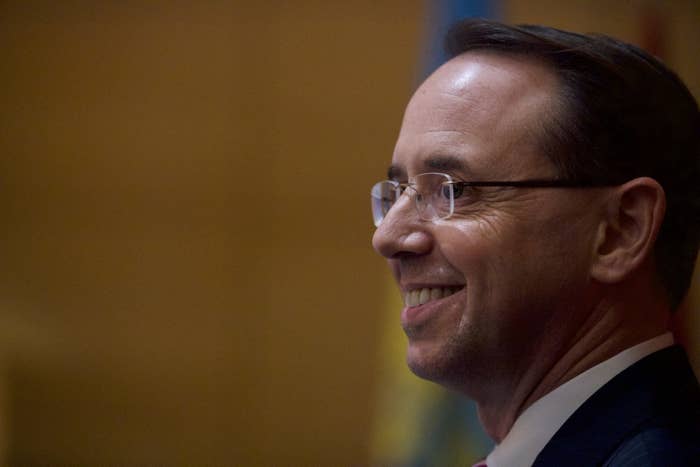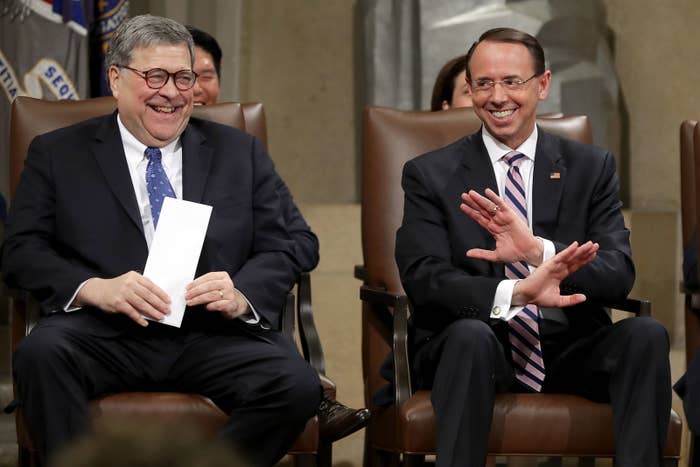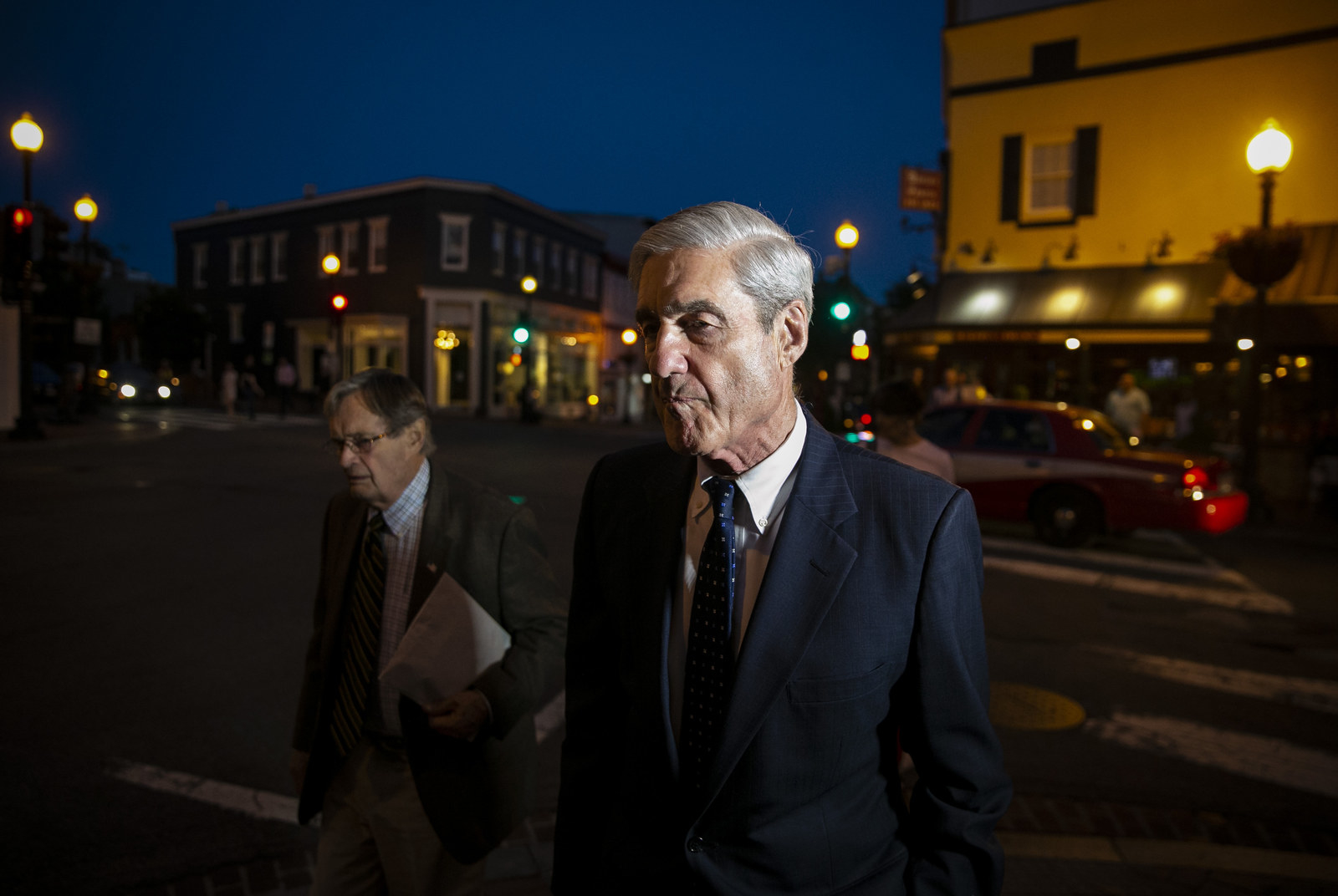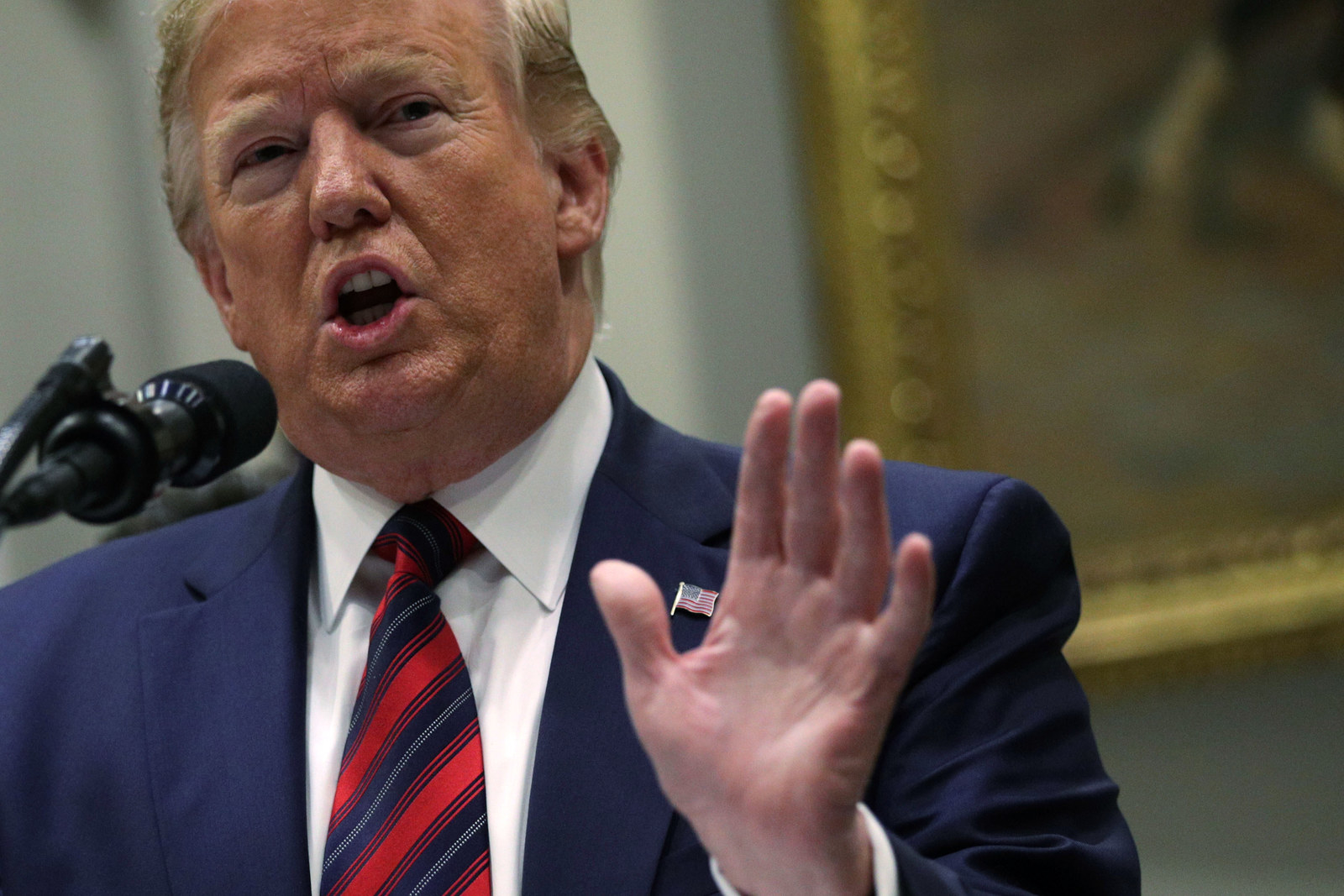
WASHINGTON — Deputy Attorney General Rod Rosenstein’s last day is tomorrow. The official who oversaw special counsel Robert Mueller’s investigation — and withstood the constant, looming threat of presidential removal — is, improbably, leaving the Justice Department on his own terms.
There was no firing by tweet. There was no unceremonious phone call from a White House aide telling him he was out. He didn’t learn he’d lost his job by watching the news.
Rosenstein notified President Donald Trump in late April that he planned to step down, ending a historically significant tenure as the department’s number two official. When Rosenstein was confirmed in April 2017, then–attorney general Jeff Sessions had already recused himself from the Russia investigation, putting Rosenstein in charge of the most politically fraught criminal investigation in decades from day one.
Trump never acted on what is by now a documented urge to get rid of the official overseeing Mueller’s work. Instead of being forced out as Sessions was after the midterm election in November, Rosenstein on Thursday got what Sessions did not: a glowing farewell ceremony in the Justice Department’s Great Hall, complete with a tribute video. Rosenstein sat on the stage flanked by Sessions and Attorney General Bill Barr as speakers praised his dedication to the department over three decades and his service over the past two years.
Sessions spoke, acknowledging the tenuous nature of his and Rosenstein’s time leading the department. Over the course of Mueller’s nearly two-year investigation, Trump privately and publicly blasted Sessions’ decision to recuse himself and Rosenstein’s decision to appoint Mueller, and made clear his disdain for what he considered a “witch hunt.”
“Our run exceeded my expectations — considerably,” Sessions said, earning laughs from the crowd.

Rosenstein hasn’t said what he’ll do next, although, in his tribute video, his current and former colleagues suggested everything from a Supreme Court seat to a university presidency; he could also take the well-worn path from public service to a lucrative private practice.
Rosenstein didn’t directly reference the Mueller investigation in his remarks — Congress is in turmoil dealing with the aftermath of the conclusion of Mueller’s work, and Rosenstein could be called to testify — but he spoke generally about how the DOJ “stands apart from politics.”
“Government officials sometimes face pressure to compromise principles, perhaps even to trade virtue for the appearance of virtue. But we should exercise caution when uncomfortable circumstances tempt us to disregard timeless principles. It is most important to follow the rules when the stakes are high,” he said.
Rosenstein’s replacement, Department of Transportation official Jeffrey Rosen, hasn’t been confirmed yet but is expected to be in place soon; the Senate Judiciary Committee voted this week along party lines to advance his nomination, and he isn’t expected to face any problems in the Republican-controlled Senate.
“Mister Peepers”
The deputy attorney general typically operates out of the spotlight, but Rosenstein was instantly at the center of a political maelstrom.
Trump was furious about Rosenstein’s decision in May 2017 to appoint former FBI director Mueller to serve as special counsel and take over the investigation into Russian interference in the 2016 election and whether there was collusion with Trump’s campaign. The president repeatedly took to Twitter to attack Rosenstein and vented about him in private — Trump reportedly considered firing him on multiple occasions — leading to speculation that Rosenstein’s job was constantly at risk.
Rosenstein developed a kind of folk hero status on the left as Mueller’s protector. Left-wing groups threatened to take to the streets if Trump fired him. Singer-songwriter Ben Folds wrote a song called "Mister Peepers," based on Trump's reported nickname for Rosenstein: "God bless the bureaucrat and the lawyer, too / They’re public punching bags / But someone’s gotta do it."
Just last year, rumors of Rosenstein’s imminent resignation or firing caused public panic. But he hasn’t been in charge of the special counsel investigation since early November, when Trump forced Sessions to resign and appointed Matthew Whitaker as acting attorney general. Barr took over when he was confirmed in February.
The special counsel’s investigation ultimately yielded seven guilty pleas from key figures in Trump’s orbit, including former campaign chair Paul Manafort, former national security adviser Michael Flynn, and former Trump attorney Michael Cohen. Several cases, including the prosecution of Russians charged with interfering in the 2016 election, are pending. Longtime Trump adviser Roger Stone was the final defendant charged by the special counsel’s office; he has pleaded not guilty.

Even after Whitaker and Barr came in, Rosenstein continued to work with Mueller’s office and played a key role in the conclusion of the investigation and review of the special counsel’s report.
Mueller formally notified Barr on March 22 that he had finished his investigation and his final report. In advance of releasing the report to the public, Barr announced that Mueller hadn’t reached a conclusion about whether Trump committed obstruction of justice. Barr said that after he and Rosenstein reviewed Mueller’s report, they concluded that the evidence didn’t support a finding that Trump had committed a crime. Nearly a month later, Barr released a redacted version of the report to the public and to Congress.
House Democrats are preparing to hold Barr in contempt for his refusal to comply with a subpoena for Mueller’s unredacted report as well as the special counsel office’s evidence and files. A protracted court fight is expected over what Congress and the public can see from Mueller’s investigation beyond the public version of the report.
Mueller’s report documented some of the tensions between Trump and Rosenstein. The special counsel wrote that Rosenstein refused a request by the White House to publicly say that it was his decision to fire former FBI director James Comey, telling DOJ officials that he wouldn’t be part of a “false story.”
Speculation last reached a fever pitch that Rosenstein might be ousted in September, after the New York Times reported that he had discussed potentially wearing a wire around Trump to secretly record the president and had talked about bringing together Cabinet members to discuss invoking the 25th Amendment to remove Trump from office. Rosenstein pushed back against the story, saying in a statement that it was “inaccurate and factually incorrect.”
The Times story was based, in part, on memos written by former deputy FBI director Andrew McCabe, whom Sessions fired in March for allegedly leaking to the media and displaying a lack of “candor” to investigators. McCabe has repeated the claims in recent weeks as part of a media blitz to promote his new book, and the Justice Department has again called them inaccurate.
A much-anticipated White House sit-down between Trump and Rosenstein after the Times story came out never happened amid controversy over the Supreme Court nomination of now-justice Brett Kavanaugh.
The No. 2 at DOJ
Rosenstein was confirmed as deputy attorney general by a vote of 94–6, a rare show of bipartisan agreement over a senior Trump administration official. Rosenstein previously served as the US attorney for Maryland under presidents George W. Bush and Barack Obama and had a reputation in the legal community for integrity and independence.
Trump referred to Rosenstein in private as “the Democrat from Baltimore,” according to the Washington Post, but he is a registered Republican, Maryland voter records show.
At his confirmation hearing, he wouldn’t commit to appointing a special counsel to lead the Russia investigation, but he did so on May 17, tapping Mueller.
Mueller’s appointment came just over a week after Trump fired Comey. Sessions recommended the firing, citing a letter Rosenstein wrote criticizing Comey’s handling of the conclusion of the investigation into Hillary Clinton’s private email server. Rosenstein didn’t explicitly advocate that Comey be fired but wrote, “Having refused to admit his errors, the Director cannot be expected to implement the necessary corrective actions.”
Trump immediately lashed out after Rosenstein appointed Mueller, tweeting the next day, “This is the single greatest witch hunt of a politician in American history!”
This is the single greatest witch hunt of a politician in American history!
The following month, Trump appeared to take a jab at Rosenstein, this time tweeting, “I am being investigated for firing the FBI Director by the man who told me to fire the FBI Director! Witch Hunt.” Trump didn’t specify that he was talking about Rosenstein, but it was widely interpreted that way, given Rosenstein’s memo about Comey.
Rosenstein did not have day-to-day control over the investigation, but Mueller was still answerable to him. Under federal regulations, Rosenstein could ask Mueller to justify “any investigative or prosecutorial step” and could override it if he determined it was “so inappropriate or unwarranted under established Departmental practices that it should not be pursued.”
Rosenstein was the only official with authority to fire Mueller under the special counsel regulations, although he could do so only for “misconduct, dereliction of duty, incapacity, conflict of interest, or for other good cause.”
The Justice Department defended the legality of Rosenstein’s decision to appoint Mueller as special counsel against attacks in court by defendants charged by the special counsel’s office, including Manafort. The DOJ in April 2018 released a heavily redacted memo from August 2017 in which Rosenstein explicitly authorized Mueller to investigate Manafort, among other subjects.
At the December 2017 hearing before the House Judiciary Committee, Rosenstein said Mueller had acted within the scope of his authority.
“I’m appropriately exercising my oversight responsibilities. So I can assure you that the special counsel is conducting himself consistently with our understanding about the scope of his investigation,” Rosenstein said.
Georgia Democratic Rep. Hank Johnson asked if Rosenstein was afraid of Trump firing him.
“No, I am not,” Rosenstein said.
“We Actually Get Along”
Throughout Rosenstein’s tenure, there were semiregular reports that Trump was interested in removing him. CNN reported in January 2018 that Trump had been venting about Rosenstein and making comments such as, “Let's fire him, let's get rid of him" before being convinced not to do so. The New York Times reported that Trump mulled firing Rosenstein in summer 2017.
The February 2018 release of a classified memo that claimed abuses of US surveillance processes by the Justice Department in connection with the Russia probe fueled speculation that Trump might move to fire Rosenstein. The memo, which was written by Republican staff on the House Intelligence Committee, stated that Rosenstein signed off on an application for a secret warrant to extend surveillance of former Trump campaign adviser Carter Page.
Concerns that Trump might move to fire Rosenstein resurfaced in April 2018 when federal agents executed search warrants on Michael Cohen. Rosenstein signed off on the warrants, according to the New York Times. Cohen later pleaded guilty in two criminal cases — one brought by federal prosecutors in Manhattan and one brought by Mueller’s office — and recently reported to a federal prison in New York to serve a three-year sentence.

In the New York case, Cohen admitted to a string of financial crimes and campaign finance violations, including that he orchestrated a $130,000 payment to adult film actor Stormy Daniels “in coordination with and at the direction of" a candidate for federal office”; the candidate wasn’t named in charging papers, but the description matched Trump.
Trump called the Cohen search warrants “a whole new level of unfairness.” The president repeated his allegation that Mueller’s team was rife with “conflicts of interest” and noted that although Rosenstein had been critical of Comey, Rosenstein also signed one of the surveillance warrants for Page. Trump’s comments didn’t directly attack Rosenstein, but the New York Times later reported that Trump considered firing Rosenstein at the time.
The relationship between Trump and Rosenstein seemed to improve as the months went on, however. In August the Wall Street Journal reported that Trump described their relationship as “fantastic,” and that the two men spoke at least once or twice a week, in addition to Rosenstein’s regular meetings at the White House with other senior officials.
In early October, after Rosenstein joined the president on a trip on Air Force One, Trump told reporters he had no plans to fire him.
“We actually get along,” Trump said.

